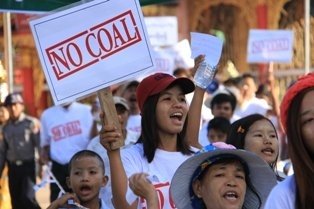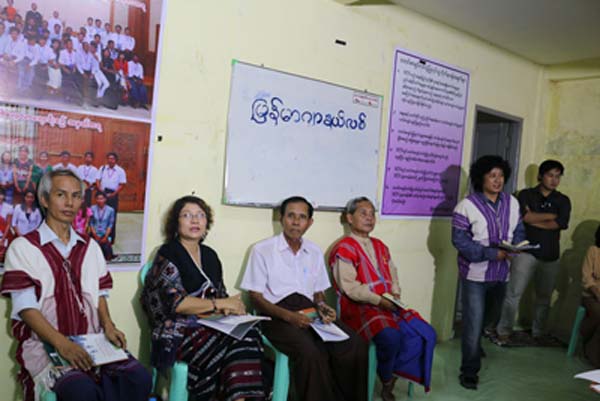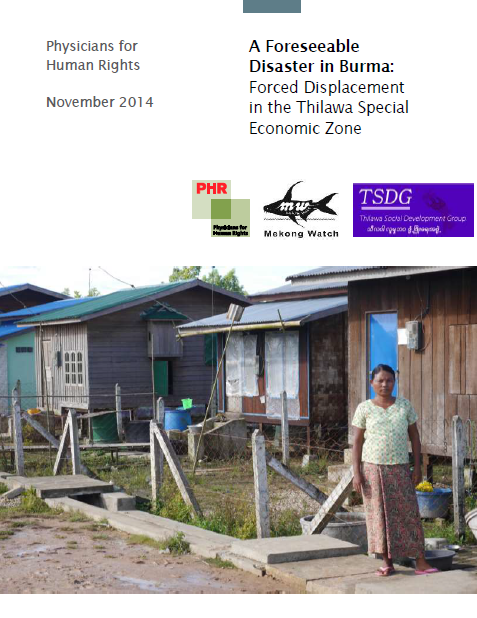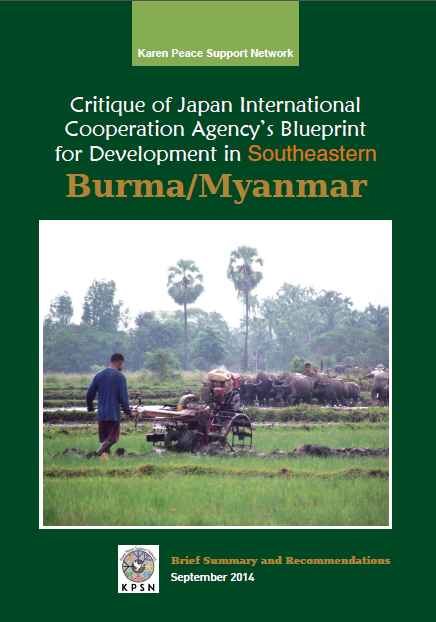Posts Tagged ‘Japan’ (28 found)
Statement by the Diplomatic Missions of Australia, Canada, Denmark, France, Japan, New Zealand, the Netherlands, Norway, Republic of Korea, Sweden, the United Kingdom, the United States of America, and the United Nations on Myanmar’s Elections
As Myanmar approaches historic elections on Sunday, the diplomatic missions of Australia, Canada, Denmark, France, Japan, New Zealand, the Netherlands, Norway, Republic of Korea, Sweden, the United Kingdom, the United States of America, and the United Nations reaffirm their support for the people of Myanmar […]
• • •Women Activists Facing Harassment by Proponents of Dawei Special Economic Zone
The Tavoyan Women’s Union (TWU) is gravely concerned at increasing harassment and intimidation of women who have been raising concerns about the impacts of the Dawei Special Economic Zone (DSEZ) and related projects […]
• • •Hundereds Protest against Planned Power Plant in Mon State
 More than 500 locals at Aunden Village in Mon State protested against a proposed coal-fired power plant project on Sunday.
More than 500 locals at Aunden Village in Mon State protested against a proposed coal-fired power plant project on Sunday.
Villagers shouted slogans, such as “No Aunden coal plant”, “Dismiss the Aunden coal power plant!”, “We don’t want Toyo-Thai Company!”, and “We don’t want coal plant in our area!” while marching through the town of Ye. […]
• •A Foreseeable Disaster in Burma: Forced Displacement in the Thilawa Special Economic Zone
Recent liberalization of some governmental policies in Burma (officially the Union of Myanmar) has led to the lifting of a number of bilateral sanctions and increases in foreign aid and investment. Both governments and corporations are entering into partnerships with Burmese companies to undertake major development projects, including building special economic zones (SEZ), developing hydroelectric dams, signing concession agreements for mining operations, and building pipelines. Despite their potential to create opportunities for economic advancement, such development projects are causing widespread forced displacement throughout the country, undermining the human rights of the people living in affected areas.
Forced displacement threatens people on every continent. Environmental degradation, conflict, the race for scarce resources, development projects, and land grabs have caused a significant number of these illegal displacements. People living in marginalized communities, including ethnic minorities and indigenous groups, are particularly vulnerable to forced displacement. […]
• • •Forced Displacement Leaves Burmese Families Living in Substandard Conditions, with Higher Rates of Hunger and Sickness
The Burmese government violated international standards when forcibly displacing families from the Thilawa Special Economic Zone (SEZ) by threatening many residents with court appearances and imprisonment, giving them inadequate compensation for land lost, and failing to provide training or other means of income to those who lost their jobs, according to a new report by Physicians for Human Rights (PHR). […]
• • •Local Communities from Dawei Call for Human Rights Violations to be Addressed in Special Economic Zone
Bangkok, Thailand – Community representatives from areas affected by the Dawei Special Economic Zone (DSEZ) questioned today how the mega-project could go ahead when so many social and environmental impacts and human rights violations have already taken place that have not been addressed. These problems need to be resolved first, before considering a new phase to this already problematic project […]
• • •Dispatches: A Scathing Verdict on Burma’s Stalled Reforms
A remarkable set of meetings took place this week in Rangoon, with more than 650 representatives from Burmese civil society groups gathering to discuss the status of the country’s reform process […]
• • •Karen Civil Society Rallies Around Japan’s Harmful Plans for Eastern Burma
 Japan’s lofty development plans for eastern Burma were very publicly rejected by the Karen Peace Support Network (KPSN) at a press conference in Rangoon, citing lack of consultation with communities and the potential for such plans to fuel conflict. Based on a blueprint for extensive development projects produced by the Japanese International Cooperation Agency (JICA), the overseas development arm of the Japanese government, 28 Karen civil society organizations that form the KPSN, released a report to outline their concerns and recommendations. JICA’s blueprint, in which its main goal is to support the return of refugees and internally displaced persons (IDPs), contains four main components; economic corridors, free trade zones and industrial estates, industrial clusters, and urban development. The Japanese government has been working closely with both the Union level and State level Burmese Government in the development of this plan.
Japan’s lofty development plans for eastern Burma were very publicly rejected by the Karen Peace Support Network (KPSN) at a press conference in Rangoon, citing lack of consultation with communities and the potential for such plans to fuel conflict. Based on a blueprint for extensive development projects produced by the Japanese International Cooperation Agency (JICA), the overseas development arm of the Japanese government, 28 Karen civil society organizations that form the KPSN, released a report to outline their concerns and recommendations. JICA’s blueprint, in which its main goal is to support the return of refugees and internally displaced persons (IDPs), contains four main components; economic corridors, free trade zones and industrial estates, industrial clusters, and urban development. The Japanese government has been working closely with both the Union level and State level Burmese Government in the development of this plan.
For Karen civil society, however, there are many concerns, as outlined in the report released on 9 September. Although the blueprint aims to “promote peace through development,” JICA has not conducted a conflict analysis on what is an extremely complicated and fragile context. In fact the plans could serve to exacerbate conflict by facilitating land confiscation, one of the loci of tension in the ceasefire process. Also, improving transport and road access to areas traditionally held by ethnic armed groups such as the Karen National Union (KNU), allows easy access for Burma Army soldiers to the heart of Karen areas. We must not forget the abusive nature of the Burma Army that has been terrorizing civilians for decades and continues to do so, despite a ceasefire in place. Will exposing more communities, who are already vulnerable to abuses, to the unreformed Burma Army really aid peace […]
• • •Critique of Japan International Cooperation Agency’s Blueprint for Development in Southeastern Burma/Myanmar
The Japan International Cooperation Agency (JICA) has recently issued a blueprint that proposes industrial development in Southeast Burma/Myanmar, purportedly to aid in the return and settlement of refugees and Internally Displaced Persons (IDPs) in Karen and Mon States. However, the Karen Peace Support Network (KPSN), a network of nearly 30 ethnic Karen organizations, cautions JICA that its blueprint for infrastructure development such as roads and industrial estates in the war-torn southeast is premature and flawed, potentially exacerbating conflict in the region.
The KPSN (formerly KCBPSN) is the largest network of Karen civil society organizations in Burma/Myanmar. These organizations have been providing support for vulnerable people in this conflict-torn region for decades, striving to empower local communities, build transparent and accountable institutions, and help create a sustainable peace in Burma/Myanmar. KPSN and its member organizations are important stakeholders which must be included in any development planning process in the Karen areas of the southeast […]
• • •Displaced Villagers File Complaint Regarding Japan’s Investment in Myanmar’s Thilawa Special Economic Zone
Tokyo, Japan – Three residents from the Thilawa Special Economic Zone (SEZ) area near Yangon, Myanmar, delivered an Objection to the Examiner for the Japan International Cooperation Agency (JICA) today in Tokyo. It is the first known formal complaint filed under JICA’s Objection Procedures since the restructuring of JICA in 2008. One of the examiners, Dr. Sachihiko Harashina met the villagers in person to receive the complaint […]
• • •










 All posts
All posts